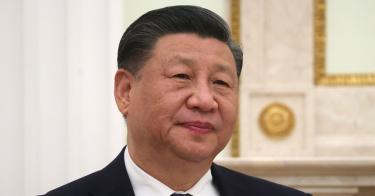It was a bad week for anyone who thought China would cooperate on emissions reduction. President Xi Jinping reiterated that his country would set its own path on the issue and not be influenced by outside factors, according to the Washington Post and Bloomberg. This contradicts Xi’s 2015 Paris Agreement pledges to reduce its carbon emissions at the latest after 2030.
Xi’s remarks came while climate envoy and former secretary of state John Kerry was visiting Beijing to reopen a dialogue. This was shortly after Secretary of State Antony Blinken arrived, and just before former secretary of state Henry Kissinger, the architect of opening China to the West 50 years ago, came for a visit.
The clear signals from China are a deliberate slap in the face to America and provide a rationale for a bill sponsored by Representative Chip Roy (R., Texas) to defund Kerry’s climate-change office at the State Department. The bill is cosponsored by over two dozen other House Republicans.
This should not be news, because Xi gave the same message last fall. In October 2022, he said that China would not abandon coal-fired power plants before renewables could substitute for the lost fossil fuel. But this substitution will not occur because fossil fuels generate substantially more energy than renewables.
>>> EPA’s Power Grid Assumptions Are Disconnected From Reality
“Based on China’s energy and resource endowments, we will advance initiatives to reach peak carbon emissions in a well-planned and phased way, in line with the principle of getting the new before discarding the old,” he announced in an address to the Communist Party Congress, as reported by Time.
Xi’s remarks should resound in the halls of the Environmental Protection Agency, which is planning to impose billions of dollars of costs on Americans to reduce U.S. emissions. China has repeatedly stated that it has no intention of going along with the Western push to net-zero.
In April, the EPA released a proposed tailpipe rule that would require 60 percent of new vehicle sales to be battery-powered electric by 2030, and two-thirds by 2032. And in May, the EPA proposed a power-plant rule that would require most power plants to sequester, or bury, 90 percent of their carbon emissions, or go out of business by 2040.
These rules would result in tens of billions of dollars in annual costs to the U.S. economy—and with no reduction to global emissions, if China replaces U.S. emissions with its own emissions.
Even if the United States were to get rid of all fossil fuels, this would only make a difference of two-tenths of one degree Celsius in the year 2100, according to Heritage Foundation chief statistician Kevin Dayaratna.
The tailpipe rule would raise driving costs for all Americans, and lower-income Americans would struggle more with those costs than higher-income Americans. New electric vehicles (EVs) cost about $10,000 to $25,000 more than the equivalent gasoline-powered vehicle, and the time it takes to recharge is inconvenient on long road trips, or if no in-home charging port is available.
Almost three-quarters of cars sold in America are used. Selling a used EV is difficult because the condition of the battery is uncertain and a new battery can cost over $10,000. EV batteries lose 20 percent to 40 percent of their range in cold climates, which is likely part of the reason why only 340 were registered in North Dakota and 510 in Wyoming at the end of 2021.
>>> Biden’s Plan To Phase Out Gas-Powered Cars Is All Pain for Consumers and No Gain
EVs are not emissions-free, because they need electricity to charge them, and electricity generation creates emissions. Even the EPA states in the proposed rule that “we expect that in some areas, increased electricity generation would increase ambient SO2, PM 2.5, ozone, or some air toxics.”
The power-plant rule would raise the cost of electricity just as the EPA plans to have millions of new EVs access the grid. Sequestering 90 percent of carbon emissions on such a large scale has never been done before, and it is not an “adequately demonstrated” technology. The only proven option for a power plant to comply with the proposed regulation is to close down.
The rule would remove power from the grid at a time when America needs more power for planned electrification, and it would likely cause more blackouts. Blackouts can have serious consequences, including death, especially if they occur during periods of unusually high or low temperatures when power is most needed.
In addition, higher costs of electricity will have adverse economic effects. Prices will rise, manufacturing will go offshore, and layoffs and unemployment will increase. All this will lower GDP growth and reduce Americans’ standard of living.
Because Xi has explicitly and repeatedly said that his country will not reduce emissions until energy from renewables replaces that from coal-fired power plants, all these costs will result in no reduction in global emissions. The EPA has America on a path to all pain and no gain.
This piece originally appeared in the National Review



